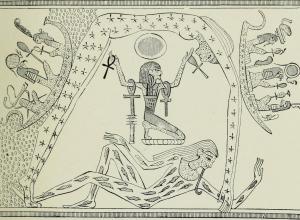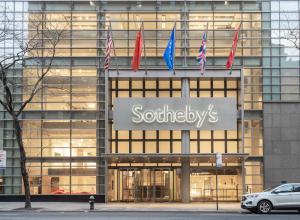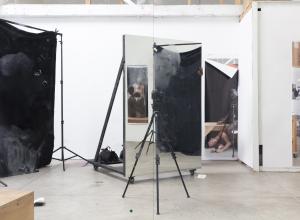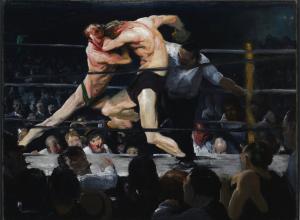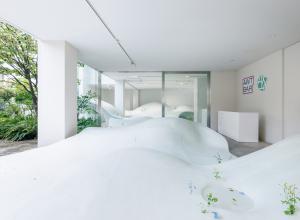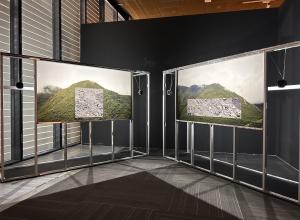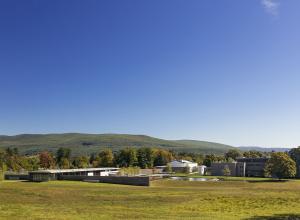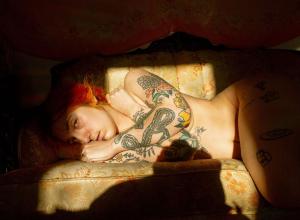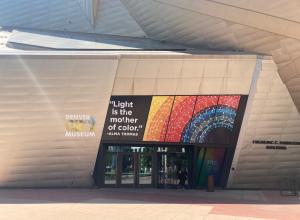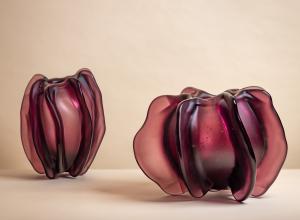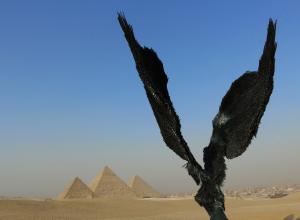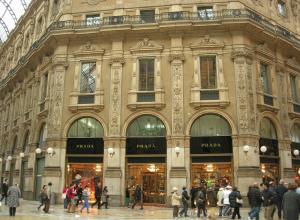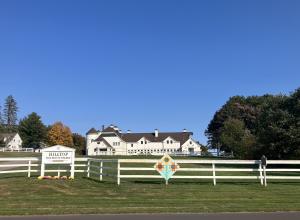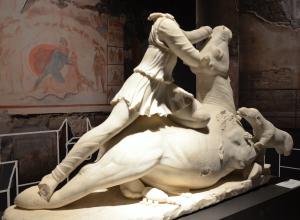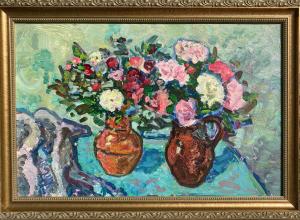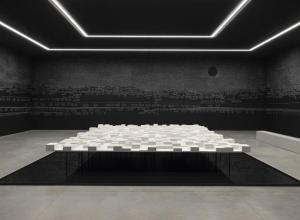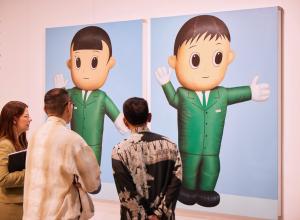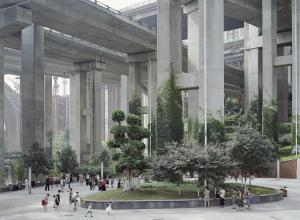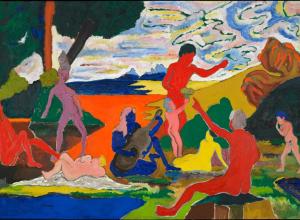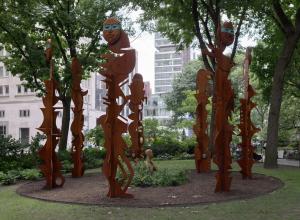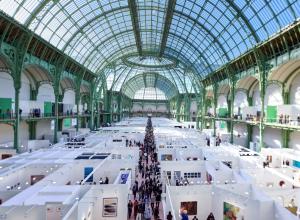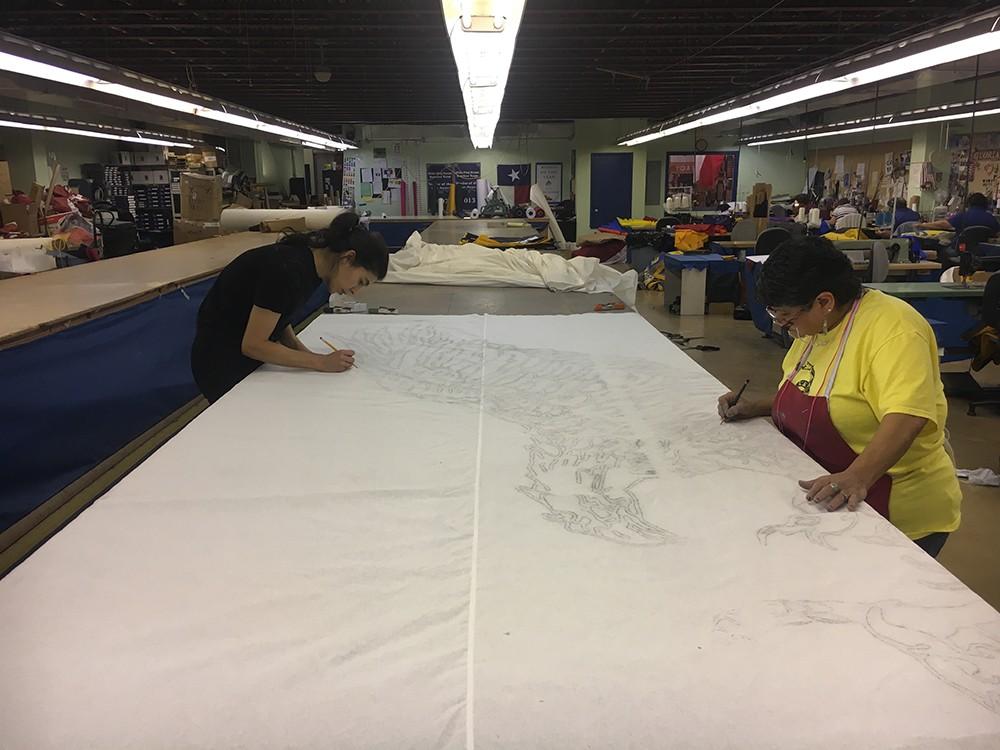
Adriana Corral's Unearthed: Desenterrado
Texas-based Artist, Adriana Corral, Sheds Light on Shadowed Part of American History
A 60-foot flagpole, hoisting a large-scale white flag adorned with bald and golden eagles, will serve as counter-monument, acknowledging a facility that processed Mexican workers into the U.S. between 1951-1964.
El Paso, Texas – A solitary 60-foot flagpole hoisting a large-scale white, cotton flag will soon be seen from the El Paso–Juárez horizon. Embroidered on either side of the flag is the illustration of a “Mexican” golden eagle and an “American” bald eagle, each emblematic of their respective nation’s patriotism. This site-specific artwork, created by Texas-based artist and Black Cube Fellow Adriana Corral, stands as counter-monument for the Rio Vista Farm, a facility most notably recognized as a key processing center for the Bracero Program.
The Bracero Program, first established by the federal government during World War II, is known as one of the largest foreign worker programs in U.S. history. According to findings from the National Trust for Historic Preservation, many people have described the Bracero Program as a period of “legalized slavery” in which Mexican workers “were met with medical and psychological examinations, stripped of their clothing, organized into lines, and fumigated with DDT before they could be evaluated by farming contractors.”
Cortney Lane Stell, Black Cube’s Executive Director + Chief Curator, believes that “by calling attention to this overlooked part of American history, Corral’s work endeavors to stand as an acknowledgement of unknown human rights violations, as well as to inspire deeper conversations about our history —and future—of border control along the U.S.–Mexico border.”
“This project emphasizes the importance of recognizing and confronting the voids within our American history,” Corral adds.
Unearthed: Desenterrado will be on display at the Rio Vista Farm until June. During the three-month exhibition, Corral’s flag will become tattered and worn due to inclement weather. After its display in Socorro, the flag will be exhibited in museums and cultural institutions across the country.
Corral states, “this project emphasizes the importance of recognizing and confronting the voids within our American history.”
Corral’s project is made possible by Black Cube’s Artist Fellowship program. Without a permanent exhibition space, Black Cube is defined by the art and the Artist Fellows it presents. All projects begin with the artists’ ideas and are developed to form the basis of Black Cube’s presence both nationally and internationally. Black Cube provides a platform for the participating artists’ work, while simultaneously guiding them through a process of reflection and analysis of their art practice. By bringing these critical elements together and nurturing them in tandem, Black Cube aims to position artists for a successful and longstanding career.
About Adriana Corral
Adriana Corral is based in San Antonio, Texas. Her installations, performances, and sculptures embody universal themes of loss, human rights violations, concealment, and memory. Corral employs a rigorous researched-based practice where anthropologists, writers, journalists, gender scholars, human rights attorneys, and victims provide her with the foundation for her works.
Corral received her Master of Fine Arts from The University of Texas at Austin and completed her Bachelor of Fine Arts at the University of Texas at El Paso. In 2016, Corral was invited to attend the 106th session of the Working Group on Enforced and Involuntary Disappearances at the United Nations in Geneva, Switzerland. She was also selected for the Joan Mitchell Foundation Emerging Artist Grant and was named one of the “18 Artists to Watch” by Modern Painters. She recently attended the International Artist-in-Residence at Artpace and the Künstlerhaus Bethanien Residency in Berlin, Germany.
About Black Cube
Black Cube is a nonprofit, nomadic contemporary art museum. At Black Cube, we see ourselves as an unconventional museum pursuing the most effective ways to engage new audiences while supporting artists’ sustainability. Without the traditional boundaries of a physical building, Black Cube is experienced primarily through pop-up art exhibitions conceived by our artist fellows. Black Cube was founded by artist and philanthropist, Laura Merage. Find out more at www.blackcube.art.




